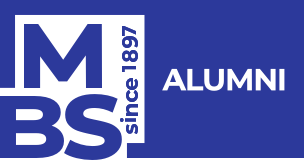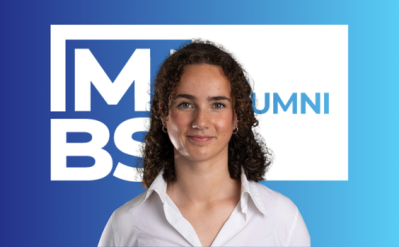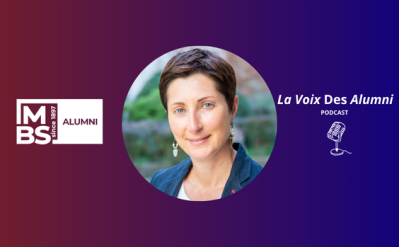News

Marion Beyret (MBS 2012) appointed new Communications and Public Affairs Director at Stellantis
From the world of the media and political communication to Major Groups, Marion (MBS 2012) has focused on developing her career with ambition and passion. Stellantis, a giant in the automotive industry, announces the appointment of Marion Beyret (MBS 2012) as Communications and Public Affairs Director.
With a rich and varied career, Marion Beyreta has developed expertise in strategic and institutional communications, acquired within major companies and institutions such as Canal+, Air France and the Élysée Palace. Her inspiring career path, marked by an ability to rise to complex challenges and mobilize an influential network, makes her a major asset to support Stellantis in its ambitions for transformation and innovation.
Heading
Could you tell us a bit about your background and experience since your years at Montpellier Business School?
I am a graduate of the Montpellier Business School (MBS) class of 2012. My years at the school were significant on many levels, both personally and professionally. It was at MBS that I forged strong ties with friends and colleagues who are still present in my life today. Before joining MBS, I attended a preparatory class in Gap, an intense period that taught me rigor and enabled me to push back my limits. It's this ability to persevere and work hard that has helped me throughout my career.
I chose MBS for the diversity of its courses, including a compulsory year abroad at the time, which deeply enriched my career and exposed me to different cultures. It was this diversity of experience and encounters that formed my initial professional network, a network that has continued to grow throughout my career.
You began your career in the media world. How did you make the switch to corporate communications?
After MBS, I started my career at Canal+ as a communications officer. This first experience was a revelation; I discovered the importance of the press and the workings of media communication. I quickly realized that the key to progress was to forge solid links with industry professionals. In fact, it was thanks to the school's alumni network and a friend's recommendations that I was directed to my internship at Canal+. It was this network that opened the door to new opportunities, such as my move to France Info. When I started to get bored with the media, it was again the network that enabled me to join Christiane Taubira's team at the Ministry of Justice. Every stage of my career has been marked by encounters and opportunities generated by this network, demonstrating how crucial it is to always nurture these connections.
Heading
What was your role as press attaché at the Élysée Palace during Emmanuel Macron's presidency?
My role at the Élysée was particularly intense and formative. I was responsible for press relations, both nationally and internationally. One of our main challenges was to position the President on the international stage, in a context of high expectations and pressure. We organized numerous trips, took part in summits such as the G7, and worked on the media coverage of his speeches. My job was to prepare and accompany journalists on the President's trips, while keeping a close eye on the narrative of each intervention.
This period taught me the importance of vigilance: every word must be weighed meticulously. I also developed crisis management skills, particularly during the Gilets Jaunes protests, a period when the Élysée's communications were under heavy media pressure. This behind-the-scenes work also relies on a network of journalists, advisors and communications professionals, which makes it easier to anticipate issues and manage relations with the press.
You also worked with Jean-Baptiste Djebbari, Minister of Transport, on a bolder communication strategy. Can you tell us more?
Working with Jean-Baptiste Djebbari was a daring experience. In contrast to the rigorous protocol I'd experienced at the Élysée, I was given the freedom to innovate in our communications actions, including launching the Minister on TikTok, a platform not yet widely used by institutions. It was a daring gamble, but one that paid off, as we succeeded in capturing the attention of a younger audience and modernizing the Ministry's image. With Djebbari, we put in place a dynamic and disruptive communications strategy, notably on subjects as varied as mobility, public transport and innovation in the sector. It was a period when we imposed almost no limits on ourselves, which enabled us to stand out from the crowd and make subjects sometimes perceived as technical much more accessible.
Heading
You joined Air France after this experience. What were your main challenges in this position?
Joining Air France was the fulfillment of a childhood dream. Ever since I was a little girl, I'd always been fascinated by aviation, largely thanks to the many trips I was lucky enough to make to visit my family in Martinique. As a little anecdote, I even told one of my classmates, the son of Air France's CEO at the time, that one day I would work for the company. This ambition never left me, and when the opportunity arose, despite the circumstances, I didn't hesitate for a second, even though I was pregnant at the time.
At Air France, the challenges were many, but the main one concerned financial communications, a field I was discovering. As a listed company, every word used in public communications could have a direct impact on the share price, making every speech extremely strategic. I had to adapt quickly and learn how to handle these specific codes, while relying on internal experts and my network, in particular to understand the global challenges facing the aeronautics industry. My role was also to work on the public perception of aviation, particularly in times of ecological transition. We conducted studies and surveys to gain a better understanding of the expectations of the various stakeholders and adjust our message. Here again, my network was invaluable in enabling me to exchange views with industry experts and strengthen our communications strategy in the face of complex and often controversial issues.
You are now Director of Communications at Stellantis. What are the main challenges ahead?
Marion Beyret: Stellantis represents a huge challenge: with 14 automotive brands under its umbrella, the group's communications and public affairs challenges are highly diversified. This new adventure gives me the opportunity to develop in areas I'm less familiar with, such as public affairs, and to broaden my range of skills. It's a dynamic and demanding environment, which allows me to keep learning every day. The challenges are many, between managing corporate communications, the ecological challenges of the automotive industry, and the need to coordinate strategies on an international scale. Once again, I'm relying on my network to find the best solutions to the challenges we face.
Heading
You also mentioned your involvement with MBS. Can you tell us about this aspect of your career?
Marion Beyret: During my years at MBS, I was part of a student association specializing in extreme sports. It gave me the opportunity to try out daring experiments and push my limits, whether by bungee jumping or other thrill sports. It was more than just a hobby; it was a way of cultivating a spirit of self-improvement and risk management, qualities that have served me well in my career. My involvement with associations was an excellent complement to my academic training, as it taught me to work as part of a team in sometimes stressful contexts, and to make quick decisions - essential skills in the world of communication.
What advice would you give to young graduates looking to move into the communications sector?
Marion Beyret: My advice would be to never doubt your worth, and to surround yourself with mentors and people you can trust. Networking is essential, especially in the world of communications where every opportunity can come from a recommendation. You also have to dare to take on new challenges, even when you're feeling a bit overwhelmed. It's often in these moments of uncertainty that we grow the most. At every stage of my career, I've been able to count on the support of my network to encourage me, advise me and open doors for me. Don't hesitate to consult your peers and surround yourself with the right people who can guide you.
Finally, what are the most valuable lessons you've learned from your years at MBS?
Marion Beyret: More than the specific courses, it's the human relations and the spirit of cohesion that have marked me at MBS. The friendships, the moments of solidarity and the support of the school, even in difficult times like my early return from China, have been decisive in my career and in the person I have become. MBS taught me the importance of networking, not just as a professional tool, but as a genuine personal support. At every key moment in my career, this network has played an essential role, whether in reassuring me, opening up opportunities or advising me in my choices.
 3
3














No comment
Log in to post comment. Log in.